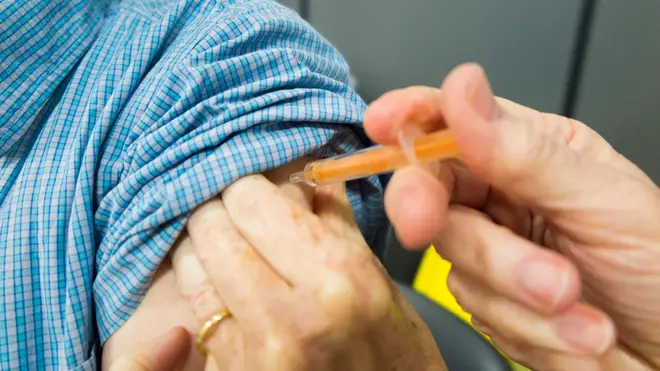
Ben Kentish 10pm - 1am
15 November 2021, 17:26 | Updated: 29 November 2021, 19:27

The Government has urged more people to take up the offer of a Covid booster jab as winter months approach - find out here if you are eligible.
This article is now out of date - please refer to this article for the latest rules.
Health Secretary Sajid Javid made a plea to the public to get their booster jabs during a Downing Street press conference on Wednesday.
The slower uptake among those eligible has caused concern for some, however, the Government is persevering in hopes of avoiding the Covid 'Plan B', which would see the return of some restrictions over the winter period.
As is evident with other vaccines, levels of protection from initial Covid jabs is likely to begin to wane over time.
The booster dose was announced in an attempt to help extend the protection gained from the previous doses, proving an effective way to keep the virus under control as we head into the winter months.
In doing so, it can help reduce the risk of hospitalisation as a result of Covid, breaking the chain between cases and deaths.
Read more: Health Minister: 'Go ahead' and book Christmas parties but come forward for booster jab
Read more: Javid's jabs plea: Health Sec says 'get your booster' as he rules out Covid Plan B

Health Secretary Sajid Javid: 'This pandemic is not over'
Much like the first phase of Covid jabs, the vaccine has only been rolled out to a few groups to begin with.
According to the NHS, they include:
People who are pregnant and in one of the eligible groups can also get a booster dose.

Sajid Javid urges over-50s to come forward and receive booster jabs
Those eligible for the booster dose were initially told they needed to wait to be contacted by the NHS at least six months after having had their second Covid jab.
However, Mr Javid announced a slight change to the rules in his latest update.
Now, if you're over 40 or in another priority group and had your second jab over six months ago you're eligible for a booster and the NHS will send you an invite.
Read more: Ex-NHS staff nurse 'terrified' and 'sad' as Covid cases rise
Mr Javid said: "If you haven't been invited within a week of reaching that six month milestone then please get on to the national booking service and book online, or phone 119, not just to save lives but to keep your freedoms too.
"Because all of these precious moments that we've been able to restore over the past few months, the loved ones that we've been able to see and the collective experiences that we've been able to share, they've been possible thanks to out vaccination programme and because of so many of you that cam forward when it was your time.
"And if we want to secure these freedoms for the long-term then the best thing that we can do is come forward once again when that moment comes."
Read more: Govt secures two new antiviral drugs to help treat vulnerable Covid patients this winter

Health Minister says vulnerable can self-refer for booster jab
The majority of people receiving their booster jabs will be offered either Pfizer or Moderna.
However, some may be given the Oxford vaccine if they cannot have the others.
As a result, there is a chance that the booster will differ from the first two doses received.
Read more: What is the UK's Covid-19 winter 'Plan B'?
As with the first two doses, there are some side effects that can be expected after having received the booster, the Government has said.
Common side effects include:
More serious side effects include: